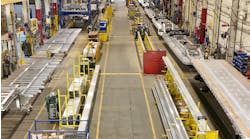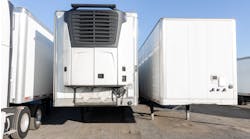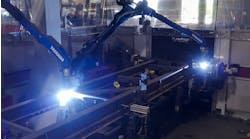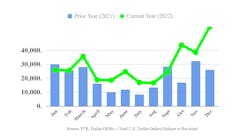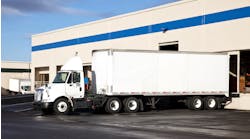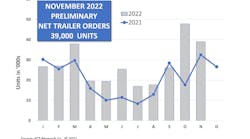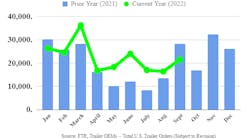Truck trailer manufacturers shipped almost 225,000 complete trailers in 1996, the third-best year on record. It caps a three-year cycle in which more trailers were built in each of the three years than ever before. Compared to previous average years, a four-year supply of trailers was built in three years.
However, for individual trailer manufacturers, 1996 was a year of disappointment. Every trailer manufacturer in the United States in the over-1,000 production range built fewer trailers in 1996 than in 1995, except for two. Heil Trailer International built slightly more tank trailers in 1996, and Timpte Industries increased its production of bulk commodity trailers by 21%. In Canada, Mond Industries Inc, a fast-growing company located in Toronto, increased its production about 18% in 1996 over 1995.
The 26 largest trailer manufacturers in North America built 187,000 complete trailers in 1996, which is about 83% of the 225,000 total shipments counted by the US Census Bureau. These same 26 trailer manufacturers say they built about 280,000 trailers in 1995. That means the entire 26-company group built 33% fewer trailers in 1996 than in 1995.
Note that the one Mexican manufacturer and two Canadian companies built some 9,400 trailers outside the US. The Hyundai production is designed for the US market, but Manac and Mond trailers are sold primarily in Canada. When subtracting these trailers built outside the US, the remaining 23 US trailer manufacturers built 79% of the trailers reported by the Census Bureau.
The leading trailer manufacturer had a 16% share of the entire US production. The top three manufacturers took 36.5% of the market. The top six manufacturers built about half of the trailers produced in the US. The top 10 manufacturers had a 64% share.
Here is how the top 24 trailer manufacturers fared during a declining market in 1996, albeit the third-best year on record:
Wabash National Corporation built 36,517 complete trailers in 1996. This represents about a 14% drop from 1995 but is 6% above Wabash's 1994 production. Net sales for 1996 at Wabash were $631.5 million, which is also 14% below the 1995 net sales. Profits took a big tumble. Net income after taxes was $3.6 million, compared to over $25 million in 1995. Besides a very competitive market, production was reduced somewhat in 1996 by slow delivery of Wabash's new composite plate sidewall. A new plant is being built at the company's Lafayette, Indiana, headquarters to supply the proprietary composite plate sidewall.
Great Dane Trailers Inc built 25,730 complete trailers in 22 1996, a 30% drop from 1995 production. About 8,000 (31%) of Great Dane's complete trailers were refrigerated vans. Great Dane also built 1,179 container chassis and 1,212 domestic containers, thus being one of the few companies making domestic containers and container chassis in 1996, a down year for all intermodal equipment. While Great Dane is undisputed number two in the unit count, it is number one in the trailer industry in dollar volume. As a privately held company, it does not report sales volume and earnings, but its volume is thought to be in the area of $800 million. In January it was acquired by the Crown family and its CC Industries of Chicago, which also own tenth-largest Pines Trailer. The new Great Dane Limited Partnership incorporates the Great Dane Trailers Division and the Pines Trailer Division. This partnership is expected to generate more than $1 billion in revenue in 1997, making it the largest truck trailer manufacturer in the world.
Utility Trailer produced 19,731 complete trailers in 1996, 21% down from its 1995 production. About 10,900 or 55% of these were refrigerated trailers. Utility's new dry freight van plant in Paragould, Arkansas, was brought up to its designed capacity level in 1996. Also, the City of Industry CA plant was modernized in 1996 and revamped to produce the same "Utility Dry'' van as the Paragould plant. As of January 1997 when the California plant made the changeover, all Utility dry freight van production is of the "Utility Dry'' design. Utility Trailer expects to expand its share of the freight van business in 1997.
Trailmobile Corporation suffered a six-month strike at the main T/M plant in Charleston, Illinois, so its 1996 production was about half of the 1995 total. Trailmobile's large-order van plant in Jonesboro, Arkansas, continued in production, but that did not help production of refrigerated vans and platforms. The final complete trailer production figure was 11,094, down 48% from 1995.
Monon Corporation managed to build some 10,000 complete trailers in 1996 even though it was shut down by creditors in October and forced into involuntary bankruptcy.
Fruehauf Trailer Corporation sought the protection of the bankruptcy courts in October 1996, but is still producing trailers. It built 8,809 complete trailers (vans, flats, dumps, and tanks) in 1996, down 47% from 1995. It had a $20-million backlog at the end of December.
Stoughton Trailers built 8,800 complete trailers in 1996, down 40% from 1995. The company also built 2,200 container chassis, down 55%, and 4,500 domestic containers, down 17%. With the intermodal market recovering, Stoughton expects to sell more total units in 1997 than in 1996.
Dorsey Trailers Inc built 8,595 complete trailers in 1996, including 1,250 refrigerated trailers. The trailer unit volume was down 30% from 1995. The 1996 sales volume was $157.4 million, down 31% from the $227.9 million in sales in 1995. This resulted in a $4.9-million net loss in 1996 versus a $4.2-million gain in net income during 1995. Dorsey President Marilyn Marks attributed the low to the "desperate pricing strategies of the major van manufacturers" and the "massive overcapacity" of the trailer industry. She expects the pricing environment to improve somewhat in 1997 as overcapacity is removed.
Dorsey Trailers started up a flatbed trailer plant in Cartersville, Georgia, during 1996, replacing the Northumberland PA dump trailer plant that was shut down in 1995 after a prolonged strike. Dorsey also acquired the Montone Trailer plant in Dillon, South Carolina, in 1996.
Strick Corporation reported production of 7,050 van trailers in 1996, down 62% from 1995. The company also built 5,400 container chassis, down 46% from 1995.
Pines Trailer limited Partnership reported its production of all-aluminum vans was down 56% in 1996, to 6,987 trailers. However, 1997 is off to a good start and production could increase in 1997.
Manac Inc experienced a very disappointing nine months at its two plants in Canada, but the last quarter was very strong. The second shift was added in October at its new van trailer plant in Orangeville, Ontario. The company is building at the rate of 120 trailers a week now. However, the average build rate during 1996 was closer to 75 a week. Total production in 1996 was 3,860 trailers, down 30% from 1995.
Lufkin Trailers produced 3,646 trailers in 1996, down 41% from the best year in its history in 1995. About 64% of Lufkin production was in van trailers and 28% in platforms. The company is expecting a good year for its van trailers, platforms, and dump trailers.
Mond Industries Inc reported a sales increase in 1996. Mond built 3,487 trailers in 1996 plus an undetermined number of domestic intermodal containers and container chassis. Trailer production was up 18% over 1995. Mond is a 35-year-old company that had been specializing in FRP vans. It started expanding when most of the Canadian trailer manufacturing plants closed. Sales doubled in 1993 and doubled again in 1994. Mond Industries is a public company with 1996 sales of $77.3 million (US $60 million). It has expanded capacity with the opening new plants in Burlington, Ontario, in 1995 and in Toronto in 1996.
Transcraft Corporation was down only 11% last year, building 3,161 platform trailers. Some of the reduction in production was attributed to bringing on line the new Transcraft Eagle manufacturing plant in Mount Sterling, Illinois. This high-production plant dedicated to a single model opened in February 1996. Transcraft's headquarters plant in Anna, Illinois, continues to build platforms as well.
Kentucky Manufacturing Company built 2,997 van trail-ers in 1996, a 7% reduction from 1995. Kentucky limits its marketing to customized vans such as household goods 24 moving vans (40%), electronics vans, and other specialized trailers.
Hell Trailer International built 2,948 tank trailers in 1996, a few more than the 2,914 in 1995. This includes not only the Heil line of liquid and dry bulk tankers, but also the J & L dry bulk tank trailers that Heil acquired several years ago, and the Trailmaster tanks added in late 1995.
Trail King Industries Inc produced 2,801 complete trailers in 1996, not counting the 500 or so light trailers built with axles under 10,000-lb capacity. This is down 9% from the 3,082 trailers built in 1995. The Trail King figures include flatbed, dropdeck, and lowbed trailers, construction trailers, tag trailers, bottom dumps, and the recently acquired Ti-Brook line of end dump trailers.
Road Systems Inc built 2,300 new van trailers in 1996, down 42% from 1995. However, new trailers are only part of the output. Road Systems also repaired, rebuilt, and remanufactured many other highway trailers for its parent CNF Transportation. The company has a new plant in Searcy, Arkansas, replacing the Fontana plant that was closed in 1996.
Timpte Inc has the distinction of building many more trailers in 1996 than in 1995. Timpte manufactured 2,208 truck trailers in 1996, up 21% from the 1,830 built in 1995. Timpte specializes in bulk commodity trailers and grain hoppers, so it is more dependent on the economy of the agricultural markets than the motor freight business. Timpte has expanded into the wood chip van business and live floor trailers.
Alloy Trailers Inc produced 2,166 trailers in 1996, about 19% fewer than in 1995. Part of this reduction can be blamed on bad weather in the Spokane, Washington area. The company lost 15 days of production in the last quarter because of weather problems.
Hyundai Precision America built 2,007 complete trailers in 1996, and this is only 30% of the number of trailers Hyundai produced in 1995. However, that is only part of the story. Hyundai built more container chassis in 1996 than all the other manufacturers in this report. The 11,530 container chassis that Hyundai built in 1996 was 22% less than its 1995 chassis output. Hyundai also built 5,185 refrigerated ISO containers in 1996, and that is three times the number of refrigerated containers it built in 1995. The 1996 production consisted of 5,010 containers 40 feet long and 175 of the short 20-ft boxes. That makes a total of 10,195 TEU (twenty-foot equivalent units). Refrigerated container production is continuing at the rate of 500 a month at Hyundai's plant in Tijuana, Mexico.
East Manufacturing Company produced 1,791 trailers in 1996, down 16% from its 1995 production. More than half of these were all-aluminum dump trailers, and the others were split between aluminum refuse trailers and platforms—both aluminum and composite.
Polar Tank Trailer Inc built 1,560 tank trailers in 1996, which is 17% below the 1995 production figure. Besides the two Polar plants in Holdingford and Opole, Minnesota, the company has a new plant in Springfield, Missouri, building the Custom Trailers line of tank transports.
Ravens Metal Products Inc produced 1,399 complete trailers in 1996, which is only 5% below the 1995 production level. About two-thirds of the Ravens production was aluminum platforms and a third was aluminum dump trailers.

